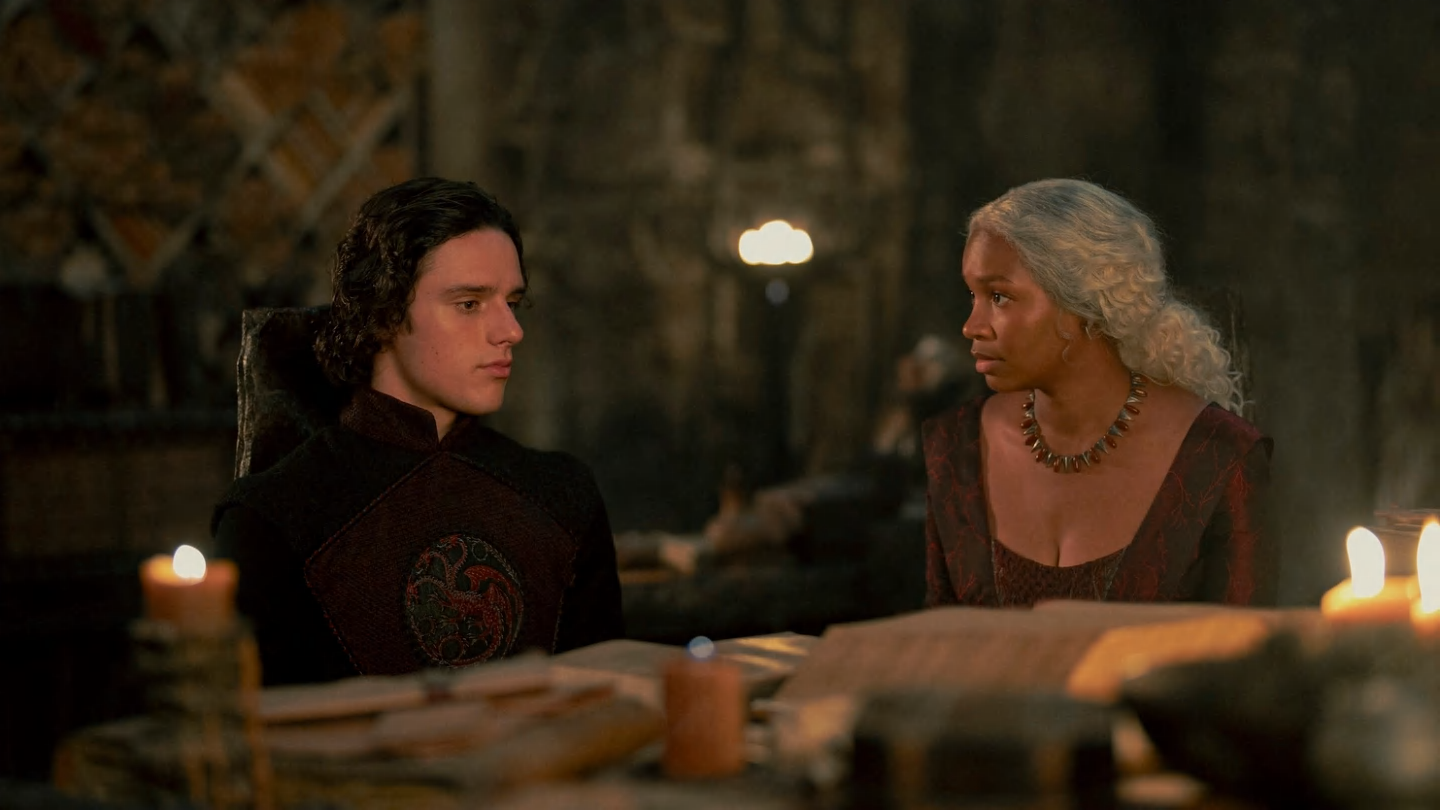
As a seasoned viewer of epic fantasies and political dramas, I must say that “House of the Dragon” has been a rollercoaster ride, to say the least. However, one aspect that continues to grate on me is the excessive focus on the appearance of Rhaenyra’s children, particularly Jace’s obsession with his hair color.
In the first season of Game of Thrones, a significant plot point revolved around the strength of the Baratheon lineage, casting doubt on Cersei Lannister’s blonde children being the trueborn offspring of her husband King Robert. The show House of the Dragon attempts to recreate this intrigue with Rhaenyra Targaryen’s children, suggesting their dark hair implies they are not the genuine progeny of her late husband Laenor Velaryon. However, this plot twist doesn’t resonate as effectively as its predecessor, potentially weakening the series each time it is mentioned.
In George R.R. Martin’s book “Fire & Blood,” the basis for the show “House of the Dragon,” Alicent spreads a gossip that Harwin Strong could be the true father of Rhaenyra’s children, but it remains unverified. The series, however, has confirmed this parentage, making discussions about it feel like wasted effort. This theory is an open secret, and frequent mentions of hair color suggest its significance…yet it seems inconsequential in the grand scheme.
From a straightforward perspective, there exist several grounds that support the notion that Jace, Luke, and Joffrey might indeed be Laenor’s sons, despite their physical features. However, delving deeply into the question of paternity may not significantly contribute to the main narrative. It seems somewhat frivolous when contrasted with more pressing issues in the story. For instance, when Jace criticizes Rhaenyra for not anticipating his having brown hair, it appears rather trivial, considering the larger challenges at play.
By placing so much emphasis on physical appearance as a factor in legitimacy, House of the Dragon is treading dangerously close to a place where hair color becomes more significant than political machinations, which is contrary to the intended direction for a franchise that centers around strategic maneuvers people undertake when vying for power.
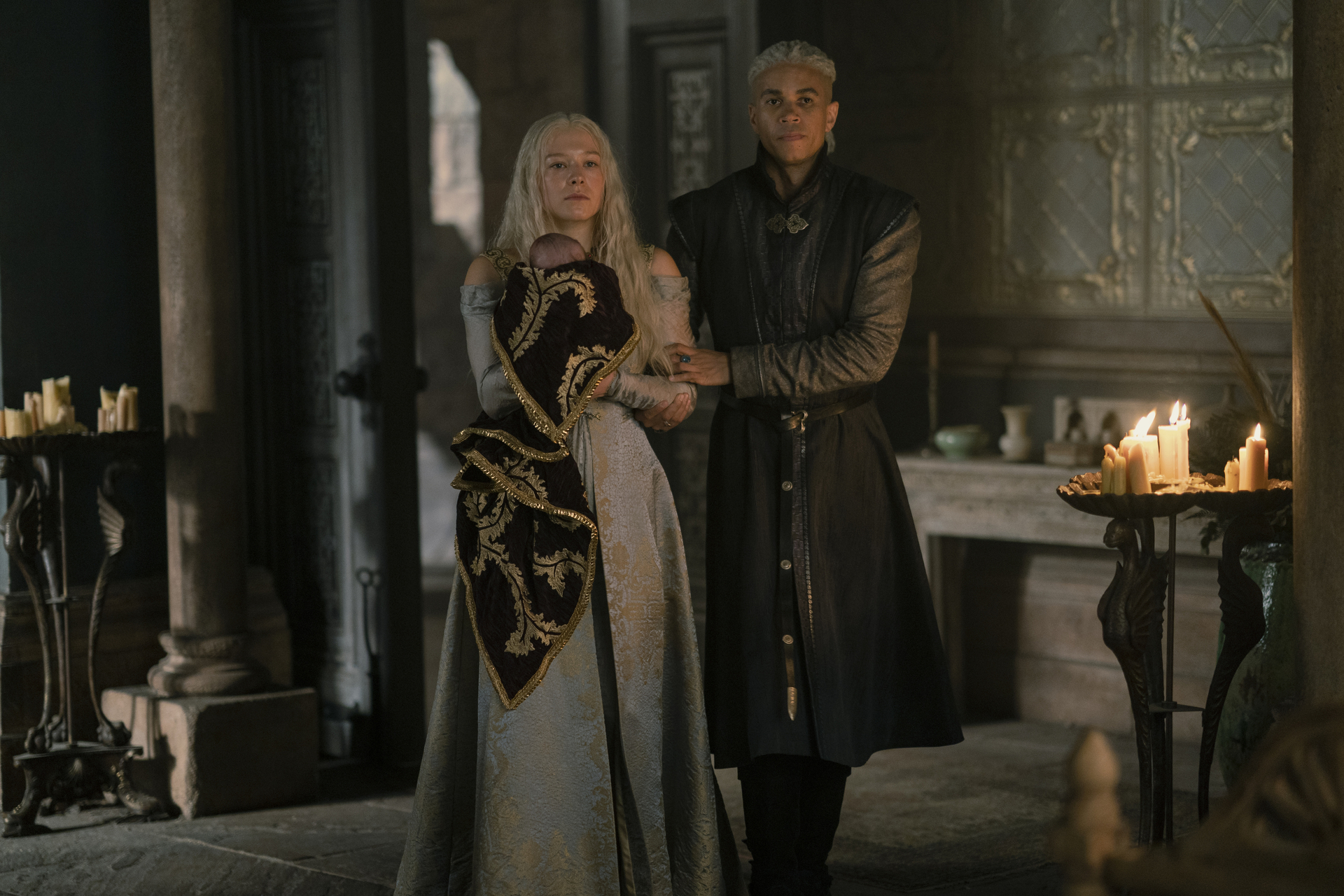
Why appearance is not proof of paternity
In the realm of “A Song of Ice and Fire,” I’ve often found that people’s physical looks are given an undue emphasis when trying to decipher family relationships. For instance, in the initial narrative, Jaime’s golden hair seemed to be the smoking gun used to accuse Cersei of infidelity against Robert Baratheon.
Beyond just noting this, it’s important to understand that each of the Great Houses possessed unique physical traits. For instance, Catelyn Stark and Lysa Arryn share a striking resemblance with auburn hair and blue eyes – characteristics traditionally associated with House Tully. This shared appearance serves as a connection to their respective birth families, even though they may have taken on different surnames upon marriage.
In the original books, only one of Catelyn and Ned Stark’s five children, Arya, resembled the traditional Stark features. Yet, despite this, none of their children’s legitimacy was ever called into question because everyone understood that the other children took after their mother. Similarly, in the short story “The Hedge Knight,” Baelor Targaryen was described as not looking like a typical Targaryen due to his dark hair. However, when it was revealed that his mother was from Dorne, this unusual appearance was readily accepted. So, while there may be exceptions to some physical traits, they do not affect one’s identity or legitimacy in the eyes of those who know their true heritage.
In the series ‘House of the Dragon’, an unusual situation arises as Jace, Luke, and Joffrey do not resemble either of their biological parents. The show portrays House Targaryen and House Velaryon by their distinctive silver hair. Moreover, Corlys Velaryon’s family is depicted with dark skin in the series. However, given that Harwin Strong’s children have fair complexion and dark hair, it’s supposed to be quite noticeable that they are indeed his offspring.
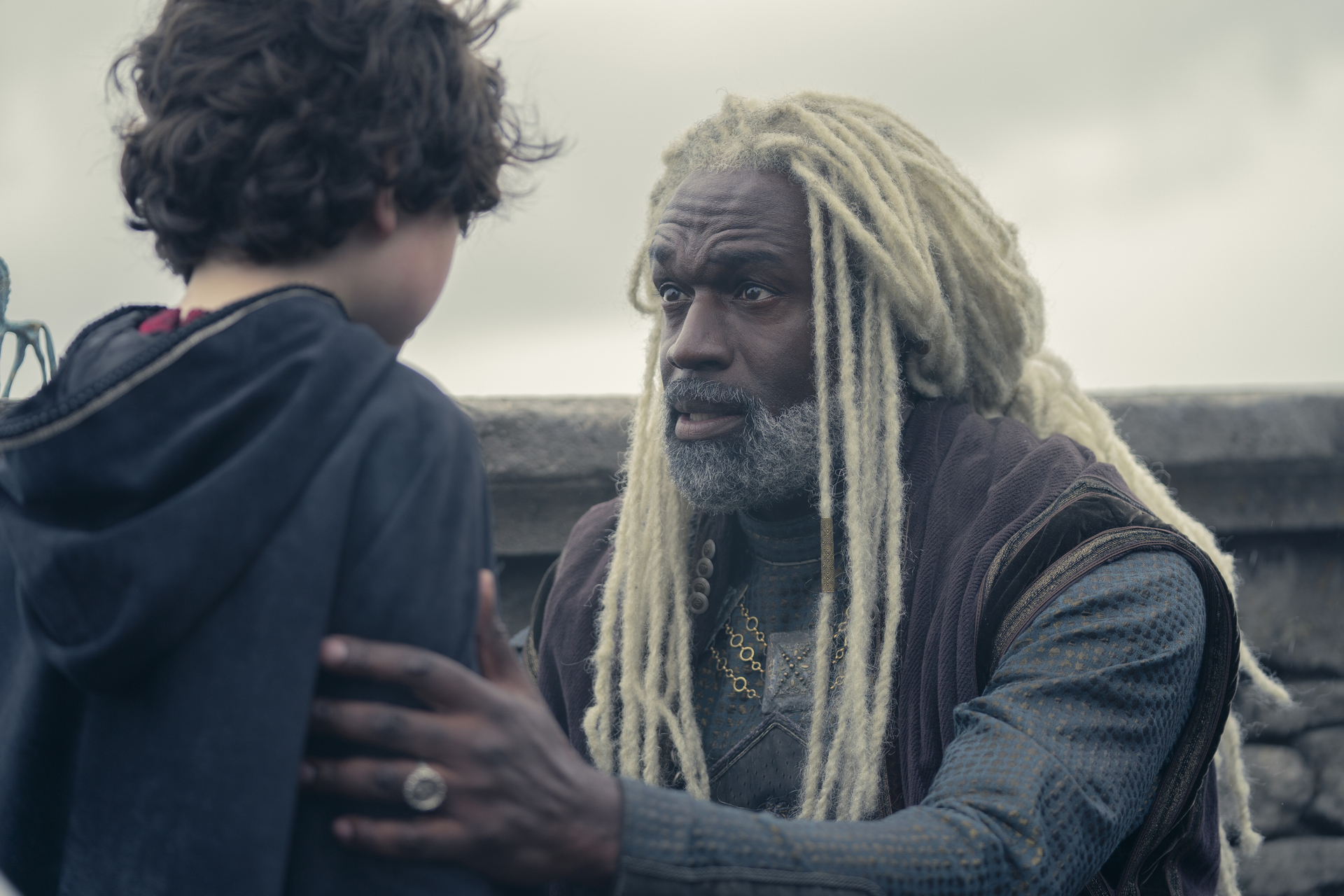
Despite appearances suggesting otherwise, it remains biologically plausible that the boys could be Laenor’s children. In our world, mixed-race individuals often resemble one parent more than the other, and this is equally possible in the universe of Game of Thrones. Even though Targaryens intermarried with House Martell, it doesn’t change the fact that there were still distinctly “Valyrian” Targaryens and “Dornish” Martells.
In the show, there is a focus on hair color, and that’s what I’ll delve deeper into. In the book “Fire & Blood,” Rhaenys Targaryen inherited her black hair from her Baratheon mother. This could be the reason behind the boys in the family having dark hair. Interestingly, although Rhaenys’ ancestry was primarily Valyrian, her black hair is significant because it contrasts with this background. Besides her Targaryen father and his ancestors, Rhaenys’ maternal grandmother was Queen Alyssa Velaryon, a Baratheon. Despite having only one Baratheon grandparent, Rhaenys displayed distinct Baratheon traits. Remarkably, her claim to the throne was never challenged due to this heritage.
In the series, Rhaenys may appear with silver hair, but she is indeed a Baratheon. Consequently, it’s plausible that her grandchildren could possess darker tresses due to their other ancestry. Moreover, Rhaenyra’s mother hailed from the Arryn lineage, which could account for more typical physical traits. The books present several Targaryens with brown hair because of their mixed heritage from non-Valyrian houses. Therefore, it’s feasible that the boys are biologically Laenor’s, though the show contradicts this by giving Rhaenys silver hair.
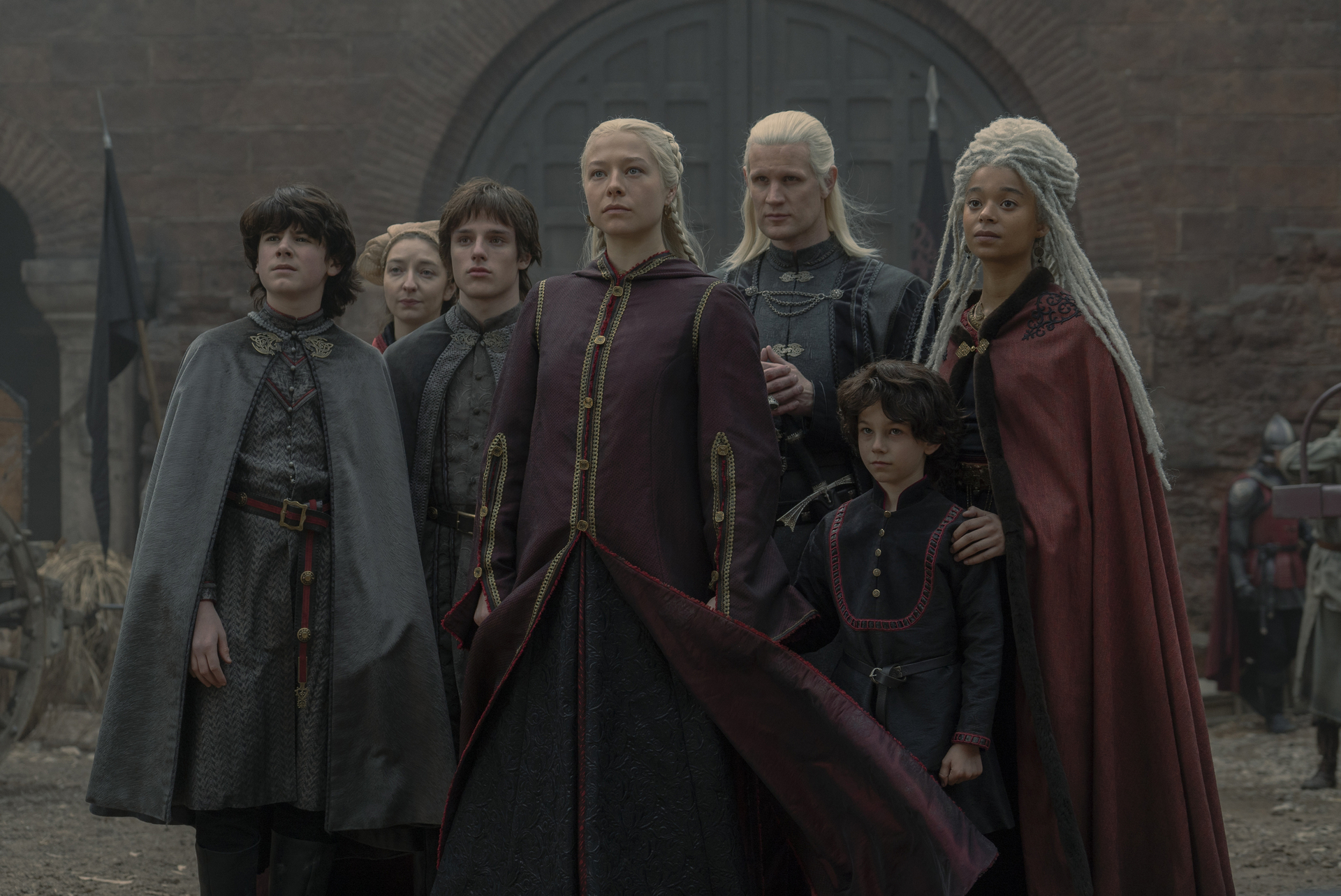
The biological truth doesn’t actually matter
Despite ample proof suggesting that physical appearance does not conclusively establish parentage, the truth remains inconsequential in this narrative. The viewers learn undeniably that Harwin Strong is the father of Rhaenyra’s children, yet Rhaenyra, Laenor, and Viserys publicly refute this claim. As a result, from a legal standpoint, the children are acknowledged as Laenor’s offspring, regardless of any other conflicting perspectives.
This franchise is heavily influenced by actual monarchies, offering a significant viewpoint. In historical times, it wasn’t rare for whispers to circulate suggesting that royal offspring might be illegitimate. However, these rumors were only confronted if the accuser had some form of evidence, power in the form of an army, and a potential successor ready to replace the current monarch. Doubting legitimacy was a risky maneuver. It wasn’t primarily done for ethical reasons, but as a means to install someone loyal to them on the throne instead.
Alicent and her kids frequently labeling Rhaenyra’s children as illegitimate could be a reckless and perilous statement, not something obvious or harmless. As Rhaenyra herself mentioned in season 1, such a claim is tantamount to treason. After all, Ned Stark met his end when he made the same accusation against Joffrey. The fact that the children’s parentage might be common knowledge doesn’t change this, as making such a statement could lead to severe consequences.
In the second season, Baela inquires from Jace, “Do you think you’re the first heir born not from your noble father?” Such situations often arise, and typically it doesn’t make much difference because it can be risky for an outsider to challenge the legitimacy of an heir who has been acknowledged as legitimate by both parents (and the king).
Anyone who menaces Rhaenyra and her offspring over their parentage is making an extremely short-sighted political move. It’s hard to understand why more individuals weren’t executed like Ser Vaemond Velaryon, and it weakens the narrative not to highlight this occurrence more frequently.
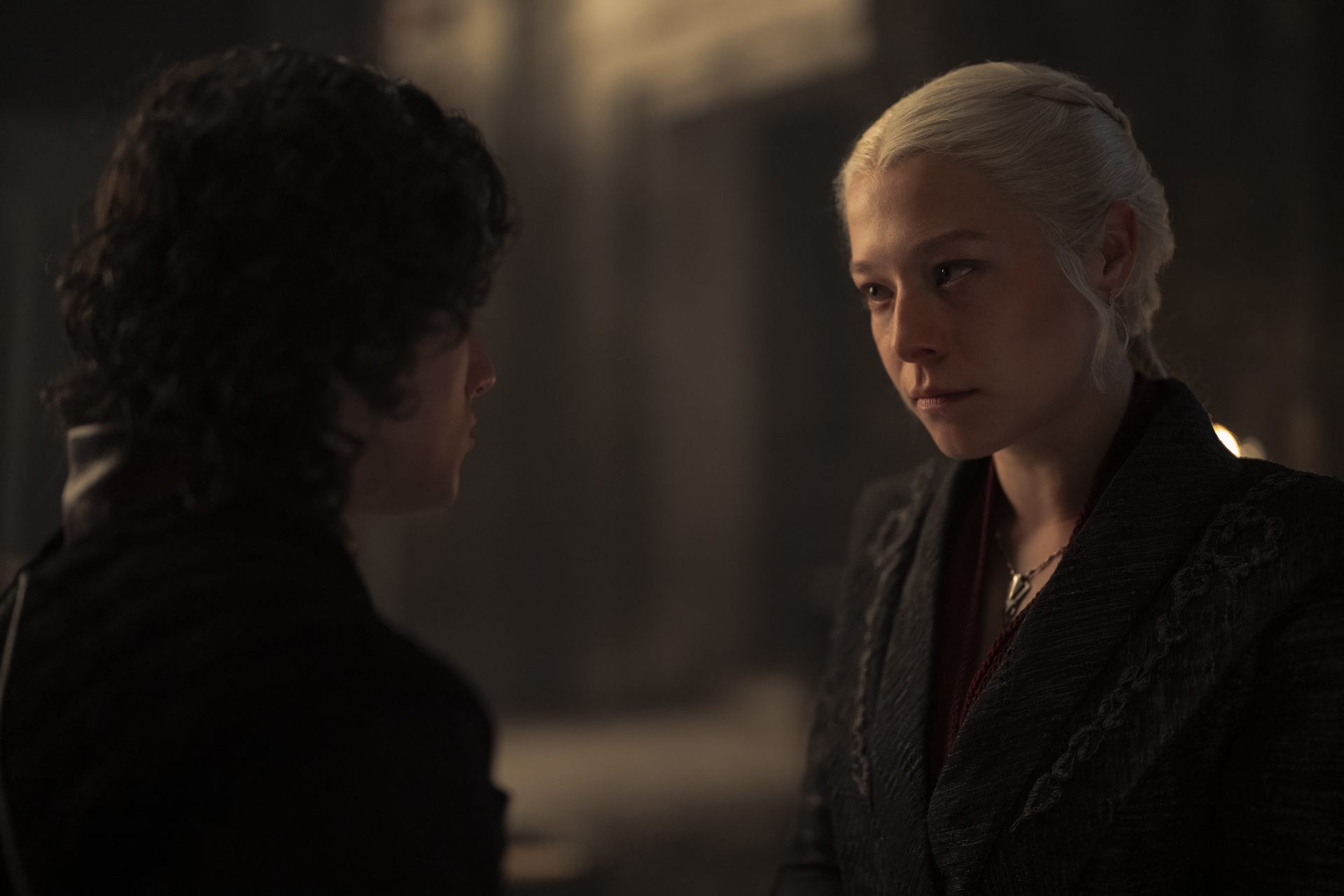
How this focus hurts the story
It’s questionable storytelling to rely on outsiders judging Rhaenyra’s children based solely on appearance, as it overshadows the more significant issue of succession. The Greens had already used Aegon’s gender as a reason he should succeed Viserys, making his offspring the natural heirs. The validity of Rhaenyra’s children’s claim to the throne was a minor concern that should have remained a symbol of their pettiness, not something everyone was focusing on to the exclusion of more important matters.
The TV series Game of Thrones emphasized the dangers and repercussions of seeking power and making mistakes in its political landscape. On the other hand, the show House of the Dragon seems to overlook the significant consequences that should have resulted from challenging Jace and his siblings. If the writers choose not to penalize characters for their questionable political decisions, and if it’s been confirmed that Rhaenyra’s children are indeed fathered by Harwin, then discussing these potential repercussions may no longer be relevant or meaningful within the storyline.
Instead of having Jace personally label his appearance as a weakness, it would make more sense for Rhaenyra’s confirmation to take precedence. While Jace’s insecurity regarding other legitimate bastards is an intriguing aspect of his character, the issue could be equally explored by focusing on Rhaenyra instead. After all, Addam of Hull, who is confirmed to be a Targaryen descendant, has the same hair color as Jace.
The TV series “House of the Dragon” has faced challenges with maintaining a suitable pace. During its first season, years of tension and slights were hurriedly covered, using several time leaps that minimized the effects of characters’ actions. In the second season, the narrative seemed slow, repeatedly revisiting similar plot elements in an effort to prolong the inevitable war.
In the series, there’s excessive focus on the physical appearances of Rhaenyra’s children, which detracts from opportunities to develop characters or drive the plot forward in more engaging ways. The show could be taking a more compelling direction, but it persists in stressing the notion that hair color somehow determines legitimacy and claim to the throne. Instead of delving into the intricacies of royal dynasties or the intricacies of warfare, viewers are repeatedly presented with simplistic lessons about genetics.
1. Demonstrate Rhaenyra struggling with the repercussions of her actions on Helaena, her only Green sibling she had a close bond with and a fellow mother whose child was unjustly slain. Illustrate Jace’s reckless behavior as he seeks to justify his claim to the throne over the dragonseeds by courting perilous circumstances. However, let’s avoid using phrases like, “Did you assume I would have dark hair?” instead.
With so much material to cover for season 3, it’s likely we might let go of this particular plotline in favor of others that significantly contribute to the storyline. Since, should the Blacks emerge victorious from the war, who Rhaenyra chooses as her heir becomes crucial, and if the Greens prevail, then her offspring would perish anyway.
I can merely wish that the authors would eventually cease treating the shade of someone’s hair as significant in determining their fate, given that they possess dragons capable of deciding disputes through fiery trials by combat instead.
Read More
- Clash Royale Best Boss Bandit Champion decks
- Vampire’s Fall 2 redeem codes and how to use them (June 2025)
- Mobile Legends January 2026 Leaks: Upcoming new skins, heroes, events and more
- World Eternal Online promo codes and how to use them (September 2025)
- Clash Royale Season 79 “Fire and Ice” January 2026 Update and Balance Changes
- Best Arena 9 Decks in Clast Royale
- Best Hero Card Decks in Clash Royale
- Clash Royale Furnace Evolution best decks guide
- FC Mobile 26: EA opens voting for its official Team of the Year (TOTY)
- How to find the Roaming Oak Tree in Heartopia
2024-09-02 17:42